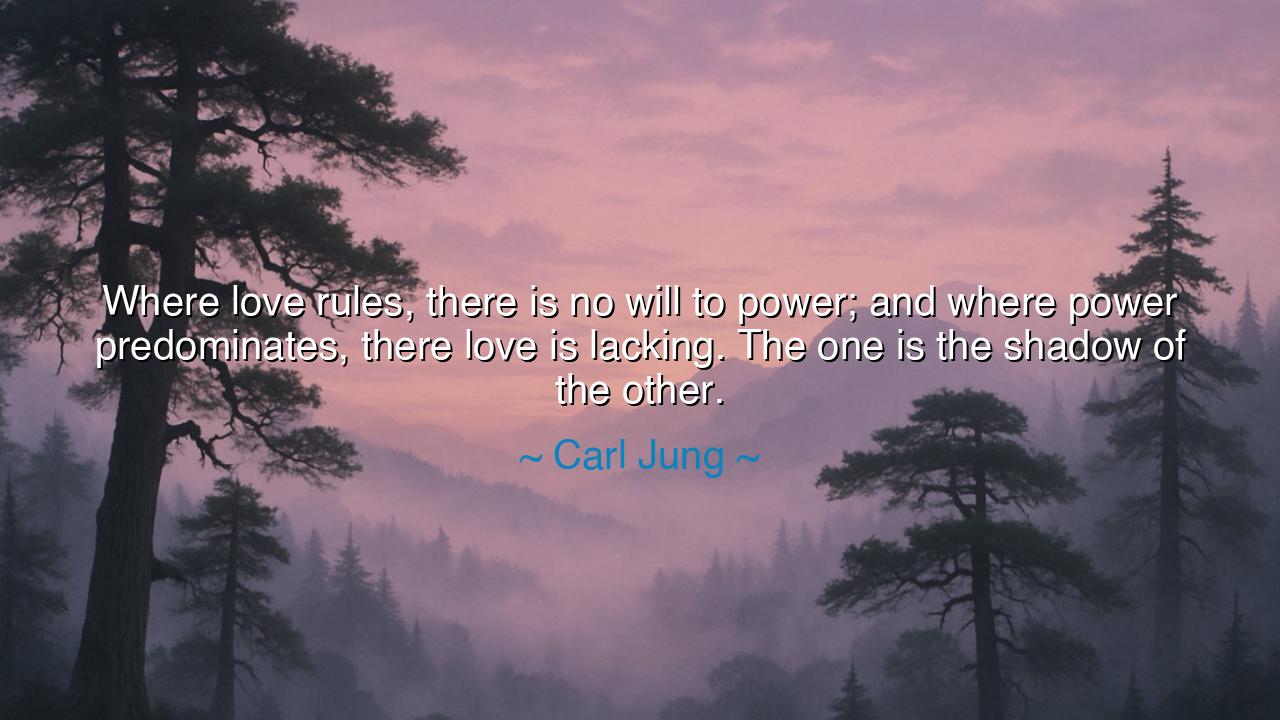
Where love rules, there is no will to power; and where power
Where love rules, there is no will to power; and where power predominates, there love is lacking. The one is the shadow of the other.






“Where love rules, there is no will to power; and where power predominates, there love is lacking. The one is the shadow of the other.” So spoke Carl Jung, whose words echo through the chambers of the soul, calling us to reflect upon the eternal tension between love and power. In this profound statement, Jung draws a sharp distinction between two forces that govern the hearts of men and women: love, that divine energy that binds us together in unity, and power, that worldly force that drives us to dominate and control. He reminds us that love and power cannot coexist in their truest forms — where love reigns, there is no need for the will to power, and where power seeks to dominate, there is no room for love to grow. One is the shadow of the other; one rises only in the absence of the other.
The ancients understood this well, for in the sagas of old, the struggle between love and power was often played out upon the stage of human history. The Greeks told of the gods who wielded great power, yet even they were not immune to the destructive force of ambition and desire. In their tales, Zeus, king of the gods, ruled with immense power, but it was Apollo, the god of music and light, who brought harmony and love to the heavens. Apollo’s power was different, for it was not born of domination, but of creation. His rule was not over others, but over the chaos that existed within the world. In this, the ancients knew that true power comes not from the will to control, but from the will to create and nurture what is good and beautiful in the world. In their view, love was not a weakness; it was the highest form of strength.
Think of the great emperor, Marcus Aurelius, whose power over the Roman Empire was vast, but whose understanding of love and compassion transcended mere rule. Marcus knew that power without love is tyrannical; it is the force that crushes, that bends others to its will, but never uplifts. His reign, though marked by conquests, was also a reign of wisdom, where he sought to lead with virtue, not with force. His writings, particularly the Meditations, reveal a man who understood that the will to power is empty without the tempering presence of love. For love is the force that binds the soul to the greater good, while power alone leads to self-interest, and often, to destruction.
In contrast, consider the tale of Alexander the Great, whose conquest of the known world is legendary. He sought to impose his will upon all who stood before him, and his power seemed endless. Yet, despite his military brilliance and the territories he conquered, there was something profoundly lacking in his empire — a lack of love among his people, a lack of unity that was built on respect rather than dominance. His empire, though vast, fractured after his death, as the forces of power alone could not hold it together. In the end, he had sought to rule, but never sought to love. His will to power was his shadow, and in his inability to build with love, his empire crumbled like the dust beneath his feet.
In our own lives, we must learn to recognize this subtle dance between love and power. To be sure, we are all called at times to exert power — to lead, to influence, and to shape the world around us. But we must ask ourselves, what is the source of our power? Is it built on a foundation of love, of seeking the well-being of others? Or is it rooted in a desire to dominate, to control, to possess? For the true measure of power is not in how many people we can command, but in how many lives we can touch and uplift with our presence.
The lesson from Jung’s words is clear: power is the shadow of love — it exists where love is absent, and where it should be. But true love has no need for power, for its strength lies not in domination, but in the connection it creates between souls. Love is not a force that demands submission, but a force that lifts others to their greatest potential. The one who loves does not seek to control, but to empower. And it is through love, the purest form of strength, that we find the highest power — not the power that crushes, but the power that elevates.
Therefore, let us look inward and ask: where in our lives do we confuse love with power? Let us strive to lead with love, for it is in love that we find the deepest strength. Let us seek to build not with force, but with compassion, and in doing so, we shall find that the power we seek to wield is not a fleeting shadow, but a lasting light that will shine through the ages. Where love rules, there is no need for the will to power, for love itself is the greatest power of all.






AAdministratorAdministrator
Welcome, honored guests. Please leave a comment, we will respond soon